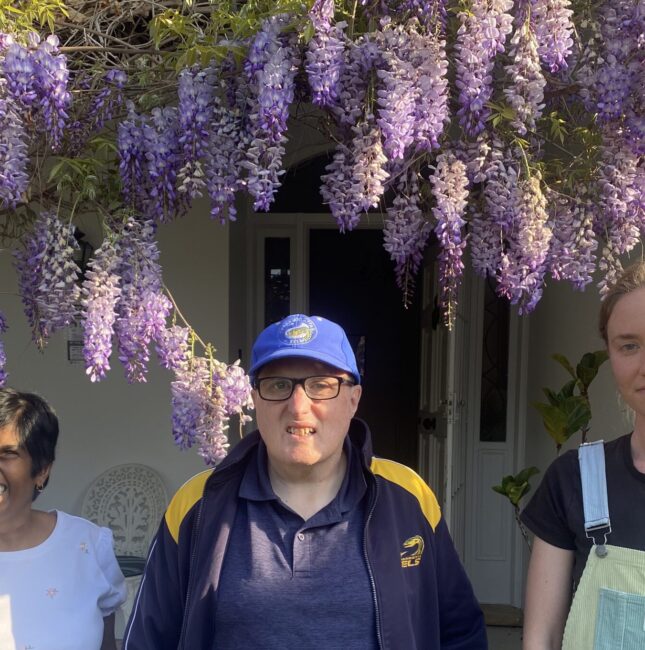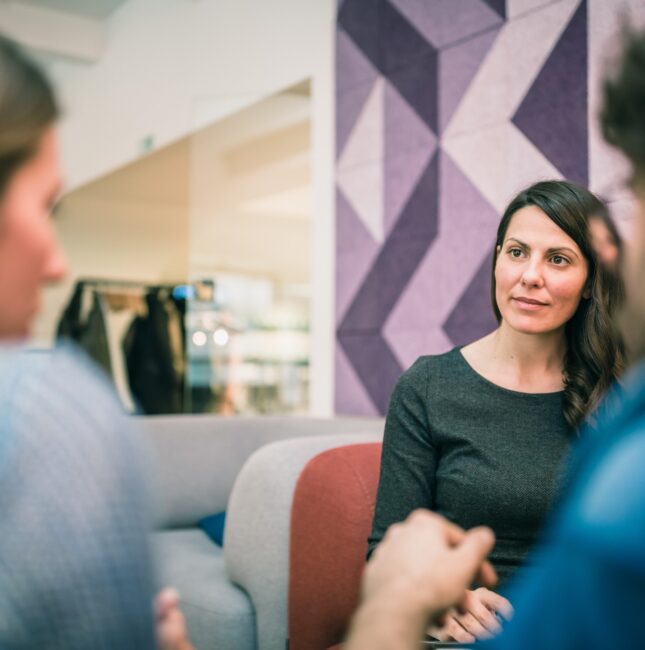Why families and educators are choosing home-based care for children
July 14, 2022
For Lisa Baker, pursuing her career in a community-based preschool simply wasn’t an option. When Lisa’s second child was born she says, “it just wasn’t affordable for me to have two children in care and be working in a preschool but I really wanted to be able to stay in the profession I loved.” For Lisa, this moment marked the start of her career in Family Day Care and she has never looked back. 19 years later, Lisa remains a passionate advocate for Family Day Care, and hopes that her story might be the encouragement that someone needs to begin their own Family Day Care journey.
Lisa was always attracted to the idea of her children being cared for in someone’s home, rather than a centre. “I always thought that day care centres seemed really big, and I wanted my son to build a strong attachment with just the one educator. I thought Family Day Care was a nice, more homely environment … so that’s where I put my first child.” After having a very positive experience with her first child, Lisa opened her own Family Day Care when her second child was five months old. To this day, Lisa can see the impact that Family Day Care has had on her own children’s lives, in particular their confidence and conflict resolution skills. “For Family Day Care Educators’ own children, it is a way for them to develop their social skills in the comfort and safety of their own home,” Lisa says. “As they watch their parent model behaviours to other children, they take it all in … and because they’re at home, they can safely practice negotiation and conflict resolution skills.” To this day, Lisa’s children who are now aged 17 and 19 are in touch with the children they met through Family Day Care, and these connections continue to enrich their lives. Today, Lisa coordinates CatholicCare’s Family Day Care: Sydney North and North West and says she is constantly inspired by the care, creativity and passion that the educators invest into their work.
And it’s that care, creativity and passion that sees the children thrive. Family Day Care Educators care for up to four children in their home, which allows them to form strong connections and tailor programs based on the needs and interests of each child. “Educators are able to be adaptable with children’s routines and, as much as possible, emulate what’s happening at home,” Lisa says. “For example, if the child needs a mid-morning sleep, they will get a mid-morning sleep.” The small groups allow educators to recognise when a child is not themselves, having a bad day or are unwell. Daily communication with families also helps educators understand events in their home lives that may be impacting their day and their emotions.
On a beautiful property in Galston, Janine, an Early Childhood Teacher, runs a Family Day Care that is unlike anything elsewhere. After working in a preschool for many years, she desired a small group environment where she could build deeper connections and set up spaces in the way she envisaged. Janine has a cottage on her property that is exclusively for Family Day Care, and she runs excursions to other parts of the property that allow the children to interact with the natural environment. Many parents are drawn to the Indigenous programming that Janine embeds into her service, which isn’t tokenistic or tacked on. At times, Janine has organised incursions and end-of-year concerts. “It really is like a mini personalised preschool,” Lisa says, “and parents are prepared to pay a higher price for it.”
Not too far away in Wahroonga, Kaori has been able to tap into a niche market that parents are literally begging for. Kaori provides a high-quality Japanese program and will alternate between speaking Japanese and English with the children throughout the day. While Kaori’s service doesn’t exclude children with a non-Japanese background, many of the children have at least one parent who is Japanese. For families where just one parent is Japanese, Kaori’s program allows the child to be exposed to the Japanese language and culture. Kaori has written a very comprehensive program with a big focus on the outdoor environment and natural play spaces. She also runs a Japanese language school on weekends and is studying a Certificate III in Disability Support. “She is one of those people you wish you had half the energy of,” Lisa says. “She is just go go go!”
Many families are attracted to Family Day Care educators who share the same cultural background, and this can be a strong selling point for educators. “Families feel really comfortable if they can find someone within their own culture to care for their child,” Lisa says, “and during that settling in period you’re much better placed to connect, settle and calm the child if you can speak their language.” More educators from diverse cultural and linguistic backgrounds are setting up Family Day Care services, “and this is wonderful,” Lisa says.
While Janine in Galston runs her service from 8am – 4pm four days a week, Kaori is open five days a week and is happy to extend her hours based on the needs of the family. “This is one of the benefits of working in Family Day Care,” Lisa says. “You can choose your own hours and days, and you get to work from home.” When an educator’s service is full, they can also earn a much higher wage than what they would in a centre-based service. For Lisa, being her own boss and working within her home was an empowering experience. “One of my favourite things was trying to figure out how many ways I could use the existing resources in my home. There is a really big push in the childcare area at the moment to be creative with your resources, to recycle and to use natural, everyday resources rather than commercially produced things. There’s so much you have access to in your home, and I loved being creative in the spaces I created.” Lisa says.
Family Day Care Educators are required to obtain a Certificate III in Early Childhood Education and Care. In CatholicCare’s Family Day Care scheme, all educators are provided with extensive training free of charge, prior to starting. New educators are buddied with existing educators for support and mentoring, and they receive regular visits from the coordination unit. “Running a Family Day Care service provides a great avenue for career progression,” Lisa says. “Managing all aspects of a business and service delivery greatly increases experience and knowledge of the National Quality Framework. This develops the educator’s confidence, and it is quite empowering,” Lisa says. Many educators go on to further study and the scheme provides these educators extra support when needed.
Many potential educators wonder if their home is suitable for a Family Day Care service. Most free-standing houses are perfectly acceptable, and the educator doesn’t need to dedicate their whole home to Family Day Care. “We will register different parts of the house,” Lisa says. For educators living in a unit, they are required to be on the ground floor, and if they don’t have a courtyard, they must have access to a nearby park. There is ample opportunity for questions and discussion as potential educators discern whether Family Day Care is for them.
More than just a care transaction, it is the sense of community formed through Family Day Care that families love. Educators make a concerted effort to forge connections between families, with one CatholicCare educator organising a meditation session for the mums. When educators are happy, motivated, and empowered, so too are the children. The flow on effect is inevitable.
For more information about Family Day Care at CatholicCare, call us on (02) 9481 2600 or email info@catholicccaredbb.org.au. CatholicCare’s Family Day Care services are now expanding to cover the entire Diocese of Broken Bay including the Lower North Shore, Hills District, Northern Beaches and Central Coast.
More news stories like this one
Mark has greater control
It's been a year of change and growth for Mark, who is a proud resident of our Supported Independent Living house in Wahroonga. Upon being asked what he most enjoys about living at Kokoda House, Mark says, “everything!”
Read MoreLet’s talk about invisible disabilities
When you think of the word, ‘disability’ what do you see? Perhaps you envision someone in a wheelchair, or a person walking with a cane. The reality is that for 90% of people living with a disability in Australia, their disability is invisible.
Read MoreMediation gives Amanda & David breathing space
When Amanda first contacted CatholicCare for help with property mediation, her life was nothing short of chaotic. “You name it, it had happened,” says Family Dispute Resolution Practitioner Melanie.
Read More


